Gala Honoree: Shannon McEachern
Oct.11.2013
 Click here for information on tickets to our Gala!
Click here for information on tickets to our Gala!
Before she even turned 30, Shannon McEachern had experienced life on the streets in New York, California, Colorado, Arizona, North Carolina and Florida.
Ms. McEachern had no home and suffered from an unshakeable drug addiction. Across the country, friends offered her bus tickets and a place to stay. Each city held the promise of a new beginning. But with each city, the same drama unfolded: Her friends couldn’t live with the drug use, and so Ms. McEachern found herself roaming the streets, suitcase by her side, asking strangers for shelter. She’d steal cash for food and sleep in abandoned buildings. A Binghamton native, Ms. McEachern lived this nomadic life for 10 long years.
Those years, thankfully, are over. In 2012, Ms. McEachern moved into supportive housing from the YWCA of Binghamton and Broome County. She has since gotten clean, become a community volunteer and grown into an all-star housing advocate.
“I stand in awe of Shannon,” says YWCA of Binghamton and Broome County Executive Director Carole Coppens. “Many of us with far more privilege don’t have the courage that this woman has.”
Ms. McEachern has blossomed into a capable, inspiring adult. She now meets with a case manager and vocational counselor to develop her newfound sense of confidence. She holds a part-time job at a local library and is working toward going to college for the first time.
Continue Reading …Gala Honoree: Johanna Flores
Oct.10.2013
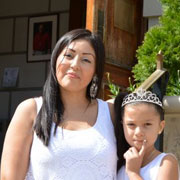 Click here for information on tickets to our Gala!
Click here for information on tickets to our Gala!
Johanna Flores bounced back in a big way.
Years ago, as a 19-year-old single mother in Tijuana, Ms. Flores was desperate to find a job to support her son. She met a man who offered her money to smuggle a suitcase full of diamonds from Mexico to New York. With hesitation, she accepted.
But it turned out that suitcase carried five kilograms of cocaine. Ms. Flores made this discovery at the JFK Airport, along with a swarm of police officers. She’d spend the next four years in prison.
More than a decade has passed since her arrest. Today, Ms. Flores is a full time employee of Hour Children, a college student, a housing advocate, a mother and a role model to formerly incarcerated women everywhere.
“At first all I did was cry. I wanted to die,” says Ms. Flores about her incarceration. “Then, one day I stopped crying and realized I had to face reality.”
She learned English, took courses and worked at the prison nursery. But she still had no prospects after release: no friends, no money and no home. So when Hour Children, a nonprofit that provides housing and services to incarcerated women, threw out a lifeline, she grabbed it.
Continue Reading …Gala Honoree: Frank Lipton
Oct.09.2013
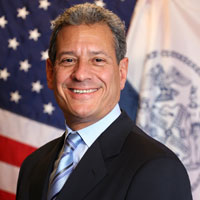 Click here for information on tickets to our Gala!
Click here for information on tickets to our Gala!
Dr. Frank R. Lipton is the quintessential unsung hero. A key government partner at the NYC Human Resources Administration (HRA) for almost three decades, he has played an instrumental, behind-the-scenes role in the supportive housing movement. With little fanfare, Dr. Lipton helped to create the program design, referral and data tracking mechanisms that made supportive housing the successful, widely-replicated model it is today. Thanks to his service, thousands of formerly homeless and disabled New Yorkers have a home tonight.
Dr. Lipton has been a constant behind New York’s historic New York/New York supportive housing agreements. He helped guide the design and passage of NY/NY I under Mayor Ed Koch and its ultimate signatory, Mayor David Dinkins. He helped usher in NY/NY II under Mayor Rudolph Giuliani and then in 2005 was at the forefront again for a NY/NY III agreement under Mayor Michael Bloomberg. When all is said and done, the combined NY/NY commitments will have created nearly 15,000 supportive housing apartments – by far the largest supportive housing program in the country.
“Frank was a major mover and shaker in the creation of the first NY/NY Agreement, and he has remained a steadfast friend and advocate of supportive housing tenants and providers for the past 25 years,” says Tony Hannigan, Executive Director of the Center for Urban Community Services (CUCS). “Our community has been truly fortunate to have the quality and dedication of his leadership during four administrations.”
Drawing on his academic and professional background, Dr. Lipton has been a vital source of data on the outcomes associated with supportive housing.
Continue Reading …Gala Honoree: True Colors Residence
Oct.08.2013
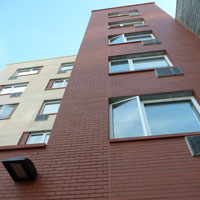 Click here for information on tickets to our Gala!
Click here for information on tickets to our Gala!
True Colors Residence is quite literally one of a kind: The first – and only – supportive housing residence for homeless and runaway lesbian, gay, bisexual or transgender (LGBT) young people AND the first New York supportive housing project associated with a genuine star.
This trailblazing residence is the result of the fortuitous pairing of West End Residences and musical icon (and recent Tony-winner) Cyndi Lauper. Long an LGBT advocate, Ms Lauper helped raise funds for True Colors, which is named after her 1986 song and album.
“The True Colors Residence provides these young people with a real home and the leg up and encouragement that will help them make it in the world,” says Ms Lauper.
To the 30 young adults who live here, the residence is an oasis from life on the street, which can be especially treacherous for LGBT youth – who make up an estimated 40% of all homeless youth in NYC.
“When my family rejected me for being transgender, I remember asking myself, ‘Where am I going to sleep? What am I going to eat?’” says True Colors Residence tenant Trina Carter. “Now, here I am at True Colors Residence, a place to better my life. What else can I ask for?”
Continue Reading …Gala Honoree: Jason Helgerson
Oct.07.2013
.jpg) Click here for information on tickets to our Gala!
Click here for information on tickets to our Gala!
Jason Helgerson became New York State’s Medicaid Director in January 2011. We’ve never looked at Medicaid the same way since. Nowhere is this clearer than in the way the healthcare system now interacts with supportive housing.
Mr. Helgerson arrived to New York from Wisconsin, where he had helped that state save millions through reforms to its BadgerCare Plus program. His reputation – that of a consensus builder who found ways to both cut costs and improve the quality of care – attracted Governor Andrew Cuomo, who tapped Mr. Helgerson to lead the Medicaid Redesign Team (MRT), an initiative to transform New York’s Medicaid program.
The MRT has led to a total reassessment of how our public health system should care for the most vulnerable. Thanks to Mr. Helgerson, supportive housing is now a central part of this effort.
Through his leadership, New York became the first state to invest in housing to lower costs and improve outcomes for chronically ill and disabled people. Presented with research on supportive housing’s capacity to lower healthcare costs, Mr. Helgerson established an MRT Affordable Housing Workgroup to map out strategies to meet the needs of unstably-housed, high-cost Medicaid recipients. He also identified over $75 million in Medicaid savings that would be invested in housing each year.
Continue Reading …Meet Our Tenants/Residences of the Year
Sep.27.2013
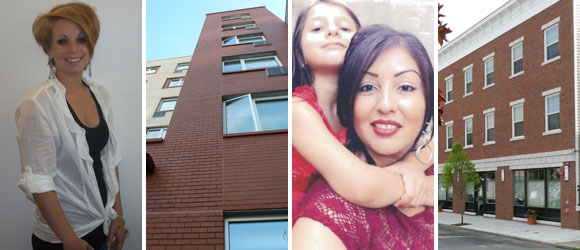
2013 Honorees (left to right): Shannon McEachern, True Colors Residence, Johanna Flores, Hill Street Inn
The Network is thrilled to announce the winners of its 2013 Tenant and Residence of the Year awards! The following buildings and individuals will be honored at our Awards Gala on Wednesday, October 16. These honorees will join three other award winners: Jason Helgerson (Government Partner of the Year), Frank Lipton (Tim O’Hanlon Unsung Hero of the Year) and Rick Lyon (Private Sector Partner of the Year).
To learn how you can attend our biggest party of the year, visit this page. We hope to see you at Capitale on October 16!
True Colors Residences
Award: NYC Residence of the Year
Nonprofit: West End Residences
Distinction: The nation’s first supportive housing residence for LGBT youth
Hill Street Inn
Award: Upstate Residence of the Year
Nonprofit: Joseph’s House & Shelter
Distinction: A once-opposed residence becomes an anchor in the community
Johanna Flores
Award: Tenant of the Year
Nonprofit: Hour Children
Distinction: A formerly incarcerated woman helps mothers and children find stability
Shannon McEachern
Award: Tenant of the Year
Nonprofit: YWCA of Binghamton and Broome County
Distinction: A chronically homeless woman becomes a powerful supportive housing advocate
Meet the leaders of Step Up on Second!
Sep.25.2013
 A supportive housing provider recognized by the Clinton Global Initiative (CGI) is in town TODAY and would love to meet the members of our community! You can RSVP to this impromptu event here.
A supportive housing provider recognized by the Clinton Global Initiative (CGI) is in town TODAY and would love to meet the members of our community! You can RSVP to this impromptu event here.
Step Up on Second is in NYC this week to attend the 2013 CGI Annual Meeting. We’ve worked together to arrange a casual gathering between Step Up and the members of the New York supportive housing community at a happy hour Tweetup TODAY at 6pm. Those in attendance will meet the Step Up executive team and members of its Board of Directors. Staff members from the Network will also be in attendance, as will other attendees of the CGI Annual Meeting. The first drink, “The CGI Special,” is on the house.
Step Up on Second is one of the Clinton Global Initiative’s 2010 Commitments to Action. This commitment is to create 200 units of supportive housing, using multiple green technologies in Hollywood, by 2014. As a result of this initiative, Step Up has hosted fundraisers with President Bill Clinton and Kobe Bryant, including one held earlier this year for a supportive housing project for transitional aged youth. You'll find video of President Clinton's speech from the event below.
See below for event details:
Continue Reading …Presentation Materials Available for Davis-Bacon Workshop
Sep.20.2013
 The Network cosponsored a special workshop earlier this week on how supportive and affordable housing developers can comply with the Davis-Bacon Act. The law, originally passed in 1931, dictates that contractors who help build federally-funded projects must pay their employees the local prevailing wage. We’ve just uploaded the presentation materials used at this workshop. You can now find PowerPoint slides from the following presenters (click each name to download): Camille Coppola of the U.S. Department of Labor, Jennifer Redmond of Goldstein Hall and Thomas Thacher of Thacher Associates, LLC. The event was cosponsored by Goldstein Hall.
The Network cosponsored a special workshop earlier this week on how supportive and affordable housing developers can comply with the Davis-Bacon Act. The law, originally passed in 1931, dictates that contractors who help build federally-funded projects must pay their employees the local prevailing wage. We’ve just uploaded the presentation materials used at this workshop. You can now find PowerPoint slides from the following presenters (click each name to download): Camille Coppola of the U.S. Department of Labor, Jennifer Redmond of Goldstein Hall and Thomas Thacher of Thacher Associates, LLC. The event was cosponsored by Goldstein Hall.
Presenters covered the basics of the Davis-Bacon law and the consequences of non-compliance. They offered practical steps that developers can take to protect themselves from wage disputes. They also discussed the importance of making sure that compliance expectations are written into the general contractor contract for every contractor on the job, the necessity of sign-in sheets and daily reports.
We thank everyone who attended this one-off workshop. For information on future Network-organized workshops and events, see our Upcoming Events page.
Tickets Now Available for Awards Gala!
Sep.04.2013
 We've just opened registration for our 2013 Awards Gala! Follow this link to learn how you can purchase tickets, sponsor the Gala and nominate a tenant or residence to be honored at our awards ceremony.
We've just opened registration for our 2013 Awards Gala! Follow this link to learn how you can purchase tickets, sponsor the Gala and nominate a tenant or residence to be honored at our awards ceremony.
Every year, the supportive housing community gathers for the Network's Awards Gala, a night to celebrate, network, snack on hors d'oeuvres and honor the extraordinary people of our community. The Gala takes place this year on Wednesday, October 16 from 6pm-9pm. The event, now in its tenth year, returns to Capitale (130 Bowery St. in Manhattan). We've completely refashioned the space this year to accommodate our ever-growing guest list.
The Gala will conclude with a brief awards ceremony. The following guests will be honored at this year's festivities:
Continue Reading …Network, CUCS Schedule Second Hoarding Workshop
Aug.13.2013
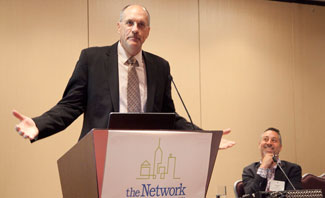 Our September 10 workshop on hoarding has sold out! Fortunately, we’ve been able to add a second session for those who couldn't RSVP in time for the first.
Our September 10 workshop on hoarding has sold out! Fortunately, we’ve been able to add a second session for those who couldn't RSVP in time for the first.
See this website to purchase tickets for our new workshop on Tuesday, September 17, from 9:30am-3:30pm. This workshop, like the first session, will take place at CUCS’ Training Center, located at 198 East 121 Street in Manhattan.
This full-day training, titled “Understanding Compulsive Hoarding,” will offer an overview of hoarding and lessons on how to best engage, assist and manage those who hoard. This workshop is presented by the Center for Urban Community Services (CUCS) and the Network. To learn about all of the Network's upcoming workshops, head over to our Upcoming Events page.
Continue Reading …